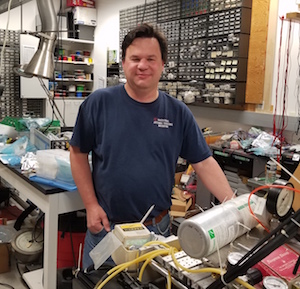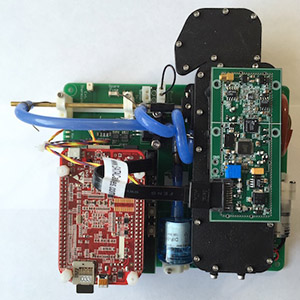A .gov website belongs to an official government organization in the United States.
A lock () or https:// means you've safely connected to the .gov website. Share sensitive information only on official, secure websites.
5 December 2016


Chemical Sciences Division engineer Steven Ciciora receives the OAR Employee of the Year Award in the category of Personal and Professional Excellence for "his outstanding innovation and hardware engineering in developing a new control and data system for a new generation of aerosol detector." This award recognizes OAR employees who have made outstanding contributions to promote excellence in the operations or programs of NOAA Research.
Steve was honored for his work on the Portable Optical Particle Spectrometer (POPS), a revolutionary instrument in optical sizing of individual aerosol particles. Aerosols (or atmospheric particles) are emitted from natural and anthropogenic sources, and are also formed within the atmosphere by reactions of emissions. Measuring aerosol particle concentration and size is an important aspect of NOAA's air quality and climate research missions. But prior to the development of POPS, no aerosol detector of science quality was available in the world that could be launched on a small weather balloon from a remote location.
Over the last year Steve developed a data system for a new generation of POPS that reduced its size, weight and cost while improving performance and adding features. He implemented a scheme for physically integrating the control electronics with the optical and power supplies to make the POPS unit a physical whole. Steve took these ideas to operation in less than a year, which speaks to his deep knowledge of microelectronics and experience in designing and building such systems. With his successful and timely efforts, the second-generation POPS units were successfully deployed to Lhasa, Tibet, in late summer 2016. Small balloons carried several POPS units on separate flights well into the stratosphere during harsh Asian Summer Monsoon conditions. The results of these flights confirmed the existence of anomalous aerosol concentrations in the lower stratosphere, which is partially due to lofted Asian pollution.
Overall, his outstanding innovation and hardware engineering in developing a new control and data system for POPS are a crucial part to this new class of instrumentation, which will globally contribute to the better understanding of atmospheric aerosols. Steve accomplished this in his role as the 'go to' guy in the ESRL Chemical Sciences Division for any challenge involving electronics.
Steve receives this well-deserved recognition at the NOAA OAR Awards Ceremony on December 5th in Silver Spring, Maryland.